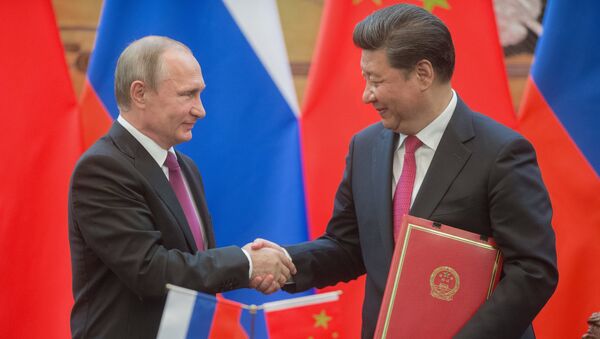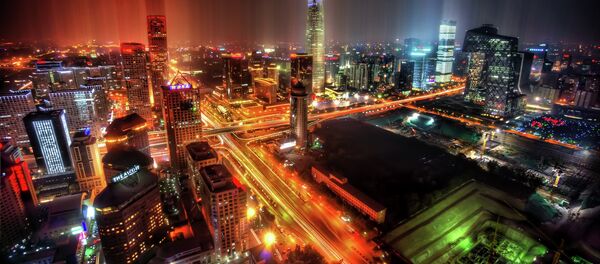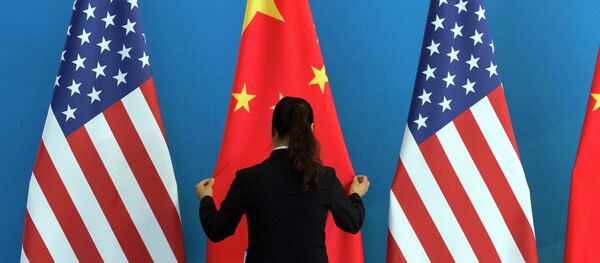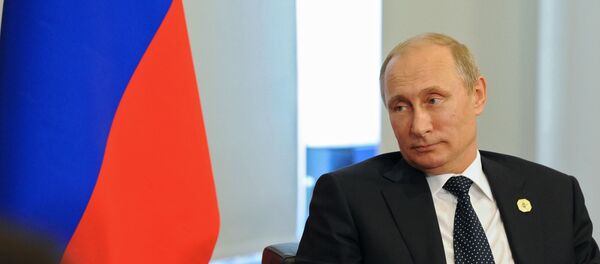The Chinese media calls attention to the fact that during their Monday phone conversation Russian President Vladimir Putin and US President-elect Donald Trump admitted that US-Russian relations have deteriorated tremendously and highlighted the necessity of restoring "a strong and enduring relationship" between the two powers.
Given this, will the Sino-Russian rapprochement lose its momentum?
People's Daily reassures its readers that such concerns are groundless.
"First, the improvement in US-Russian relations does not harm the interests of China," the media outlet explains, "It is the reduction of tensions between the two countries."
For his part, Professor Luo Yingjie of the University of International Relations believes that "Trump's embrace of Russia faces limits."
"While we see the desirable prospects of Russia-US relations after Trump takes office, we should be clear that this is not an easy task," the Chinese academic writes in his opinion piece for The Global Times.
"The Russia-US relationship is now at its lowest ebb since the Cold War and needs time to recover. Since the Ukrainian crisis erupted in 2014, the US, together with other Western countries, has imposed several rounds of economic sanctions on Russia, and Russia also took countermeasures. The conflict between Russia and the US in Syria is hard to resolve," he said.
For a long period of time the policy of containment toward Russia has been "the mainstream" of Washington's foreign strategy. The US tried to prevent Russia from regaining its superpower status at all costs.
"Even a [US] president who favors Russia cannot easily resolve the tensions between the two countries," the academic believes.
Meanwhile, the development of Sino-Russian relations is a positive process which comes at no price for Moscow, according to the People's Daily.
Therefore, the media outlet says, "Russia will not sacrifice the Sino-Russian relationship for the development of Russian-American relations."
The "China-US-Russian triangle" is likely to remain one of the most stable groups of relations
"We believe that the leaders of both countries [Russia and China] as well as their diplomatic elite would protect the status quo established jointly by China and Russia," writes the People's Daily.
"In all likelihood, the US will bolster its military and military-technical support for Taiwan, dubbed by one of Trump's advisors a 'beacon of democracy' in Asia… Combined with the socio-political situation on the island which is currently unfavorable for China, this support will force the Chinese to concentrate large forces in areas adjacent to the island, thus creating a permanent point of tension there," Kashin suggested in an interview with Sputnik.
Only time will tell whether this "peace through strength" policy toward China will bear any fruit to the US, Kashin noted, warning that "the situation in the Asia-Pacific region will become much more explosive" and that to some extent may also affect the interests of Russia.
However, some observers call attention to the potential signs of improvement in Sino-American relations.
Tom McGregor, Commentator and Editor at CNTV, admitted that tensions between Beijing and Washington may "devolve into trade and global currency disputes."
However, "China's Belt & Road can play a pivotal role to help Trump make American infrastructure great again. The first step will be for Trump to sign the US up as a member of the China-led Asian Infrastructure Investment Bank (AIIB)," he predicted.
Furthermore, James Woolsey, a senior adviser to Donald Trump, told South China Morning Post that he expected a "much warmer" response from Trump's administration to China's One Belt, One Road infrastructure project.
As Chinese academic Li Kaisheng of Shanghai Academy of Social Sciences noted in his op-ed for The Global Times "Trump might see China's rise from a more pragmatic perspective based on concrete benefits."
"Both sides might grapple with each other over matters that concern the immediate interests of the US, but seek deeper cooperation in less disputed aspects," the academic believes.






